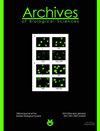Protective effects of astragaloside IV against hypertension-induced vascular remodeling involves the DNMT1 and TET2 signaling pathway
IF 0.8
4区 生物学
Q4 BIOLOGY
引用次数: 1
Abstract
Proliferation, migration, and the phenotypic switch of vascular smooth muscle cells (VSMCs) play an important role in vascular remodeling induced by hypertension. Astragaloside IV (AS-IV), the active ingredient of Astragalus membranaceus, has been shown to exert a beneficial role in cardiovascular disease. The present study aimed to investigate the mechanism responsible for the protective effects of AS-IV on hypertension-induced vascular remodeling. AS-IV significantly reduced blood pressure and aortic media thickness in two-kidney, one-clip (2K1C) hypertensive rats. AS-IV administration downregulated the expression levels of DNA methyltransferase1 (DNMT1), matrix metalloproteinase (MMP2) and proliferating cell nuclear antigen (PCNA) and upregulated the expression of smooth muscle 22? protein (SM22?), ?-smooth muscle actin (ACTA2) and ten-eleven translocation 2 (TET2) in the aorta of hypertensive rats. AS-IV inhibited the proliferation and migration in VSMCs treated with angiotensin II (Ang II). AS-IV increased the expression of SM22?, ACTA2 and TET2, and decreased the expression of collagen Ia (COL-1a), collagen IIIa (COL-3a), DNMT1, MMP2 and PCNA in vitro. Reduction in 5-methylcytosine (5-mC) was observed in VSMCs treated with AS-IV. Knockdown of DNMT1 induced the expression of TET2, while the level of DNMT1 did not change after knockdown of TET2. These results suggest that AS-IV reversed hypertension-induced vascular remodeling by inhibiting DNMT1 and upregulating TET2.黄芪甲苷对高血压血管重构的保护作用涉及DNMT1和TET2信号通路
血管平滑肌细胞(VSMCs)的增殖、迁移和表型转换在高血压诱导的血管重构中起重要作用。黄芪甲苷(Astragaloside IV, AS-IV)是黄芪的有效成分,已被证明对心血管疾病有有益作用。本研究旨在探讨AS-IV对高血压血管重构保护作用的机制。AS-IV显著降低了双肾单夹(2K1C)高血压大鼠的血压和主动脉介质厚度。AS-IV给药下调DNA甲基转移酶1 (DNMT1)、基质金属蛋白酶(MMP2)和增殖细胞核抗原(PCNA)的表达水平,上调平滑肌22?高血压大鼠主动脉中-平滑肌肌动蛋白(ACTA2)和10 - 11易位2 (TET2)的表达。AS-IV抑制血管紧张素II (Ang II)处理的VSMCs的增殖和迁移,增加SM22?, ACTA2和TET2,并降低体外Ia胶原(COL-1a)、IIIa胶原(COL-3a)、DNMT1、MMP2和PCNA的表达。AS-IV处理的VSMCs中5-甲基胞嘧啶(5-mC)减少。敲低DNMT1可诱导TET2的表达,而敲低TET2后DNMT1的表达水平未发生变化。这些结果表明,AS-IV通过抑制DNMT1和上调TET2来逆转高血压诱导的血管重构。
本文章由计算机程序翻译,如有差异,请以英文原文为准。
求助全文
约1分钟内获得全文
求助全文
来源期刊
CiteScore
1.40
自引率
0.00%
发文量
25
审稿时长
3-8 weeks
期刊介绍:
The Archives of Biological Sciences is a multidisciplinary journal that covers original research in a wide range of subjects in life science, including biology, ecology, human biology and biomedical research.
The Archives of Biological Sciences features articles in genetics, botany and zoology (including higher and lower terrestrial and aquatic plants and animals, prokaryote biology, algology, mycology, entomology, etc.); biological systematics; evolution; biochemistry, molecular and cell biology, including all aspects of normal cell functioning, from embryonic to differentiated tissues and in different pathological states; physiology, including chronobiology, thermal biology, cryobiology; radiobiology; neurobiology; immunology, including human immunology; human biology, including the biological basis of specific human pathologies and disease management.

 求助内容:
求助内容: 应助结果提醒方式:
应助结果提醒方式:


